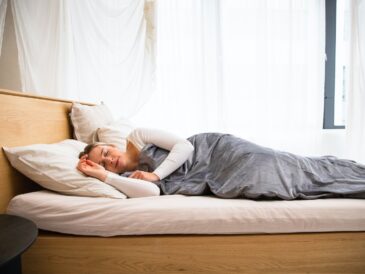Soft mattresses provide excellent pressure relief. A soft mattress may also help avoid sagging while maintaining proper spine alignment for light-bodied individuals, providing them with optimal sleep conditions and providing proper spinal alignment.
Back and stomach sleepers require extra support in order to avoid sinking too deeply into their mattresses, thus prompting them to opt for firm mattresses.
Comfort
Hard mattresses tend to have a firmer surface, making it harder for some people to adjust. But hard mattresses provide great spinal support by mimicking its natural curvature. As such, hard mattresses may be beneficial in relieving back pain as they don’t put undue stress on joints and spine.
Soft mattresses provide a much softer sleeping surface and tend to be easier for most sleepers to adapt to, while firmer ones provide more body contouring support and contouring capabilities. Soft mattresses may allow people to sink deeper, leading to discomfort or pressure points in certain parts of the body.
Physical size and weight can have an effect on how comfortable a mattress feels for each sleeper. Heavyweight individuals may prefer firmer mattresses because they allow adequate sinkage without feeling like they’re slipping out of the bed; on the other hand, lighter individuals typically experience less sinkage, preferring soft to medium firm mattresses instead.
Pillow loft also plays an integral part in determining a mattress’s firmness and support, with higher lofts providing greater support while lower lofts diminish it.
Firm mattresses provide exceptional support to both back and stomach sleepers, preventing their back from dipping and hyperextending to cause lower back discomfort. Firm beds also help those suffering from back or neck conditions by supporting the curves of the spine and keeping shoulders from collapsing, which could otherwise result in neck pain.
Firm mattresses feature thin comfort layers that help keep them cooler than soft ones by trapping less body heat and allowing more airflow between each thread of material. Furthermore, firmer mattresses allow easier movement around them.
Durability
Hard mattresses tend to outlast soft ones in terms of longevity; soft materials tend to compress more easily, leading to reduced support and eventually leading to sagging over time.
However, the durability of a mattress depends on several other factors as well, including its construction and materials – specifically its comfort layer thickness; thicker comfort layers typically translate to more resilient mattresses while thinner ones will likely be less sturdy.
Firm mattresses may exacerbate back pain: For individuals suffering from specific forms of arthritis or scoliosis, firm mattresses can actually increase discomfort by exerting increased pressure on joints as they don’t conform to body curves and provide proper alignment.
Adjustment Period: For some sleepers, transitioning to a firm mattress may cause them discomfort for several nights as their bodies adjust. You could try adding cushioned pads like mattress toppers or pillows until your body adjusts to its feel.
Too Soft For Most: Mattresses that score 1 out of 10, on the firmness scale, would be considered ultra-soft and may not support most individuals adequately.
Petite and average-sized sleepers will benefit most from a soft mattress, as it won’t place too much pressure on their bodies. Furthermore, it provides better motion isolation – great for couples that both toss and turn or one partner gets out of bed frequently. Unfortunately though, soft mattresses won’t provide sufficient support to those weighing over 130 pounds, leading to poor quality of restful sleep and muscle soreness over time.
Temperature
If you tend to find it difficult to sleep through the night due to feeling too warm, a firm mattress may be ideal. These mattresses feature thinner comfort layers which allow more airflow through and keep you cooler during the night. Firm mattresses may also be great options for people suffering from back pain as they provide gentle support to both spine and joints.
Firmer mattresses can also help those sleeping on their stomach or back achieve proper spinal alignment during the night, yet too-firm beds may cause tension in the body to remain throughout the night and lead to muscle, neck, or back pain in the morning. Furthermore, such beds prevent our bodies from decompressing during sleep which ultimately reduces sleep quality significantly.
Softer mattresses suit a wider range of sleeper preferences than firm ones, accommodating both lightweight and heavy sleepers alike. Soft mattresses tend to use cushioning materials like quilted pillow tops or thick sections of memory foam in their top layers that provide deep sinkage, body contouring and pressure relief on shoulders, hips and torso areas.
These mattresses tend to be less costly and easier to move around on than their hard counterparts due to offering more give in their surface. Unfortunately, however, they tend to deteriorate more quickly and eventually need replacing more frequently as they use lower quality materials than hard mattresses.
Soft mattresses tend to become hot during the night due to their close conformance and use of materials that trap heat. Firmer mattresses on the other hand don’t experience such issues due to minimal sinkage and increased airflow around their bodies – making them an excellent option for hot sleepers who tend to wake up wavy, sweaty, or uncomfortable.
Pressure Points
Pressure points are areas that experience stress while lying down, such as hips, shoulders, back and buttocks. A good mattress should alleviate these pressure points so you can experience better restful slumber. Your choice will depend on your sleeping position and personal preferences; side sleepers may find softer surfaces more accommodating as it molds to their curves while supporting hips and shoulders; however a soft mattress could allow their spines to sink too deeply into bed leading to backache or other forms of discomfort.
Medium soft mattresses tend to be ideal for most people as they provide enough support and cushioning to keep the spine in proper alignment while offering cushioned comfort for hips and shoulders. Firmer mattress options with zonal support may also be suitable.
Physical size and weight have an influence on how different firmness levels feel for different individuals. Heavier sleepers require firmer mattresses in order to provide support and avoid sinking too deeply into their mattresses, while lighter sleepers may find firm beds too hard and uncomfortable.
Selecting the ideal firmness level for your mattress is crucial as it will shape how you feel throughout the day and night. Ideally, the firmness should fit with your preferred sleeping position and how often you spend in bed each day. Active people could benefit from a firmer mattress as it will support proper posture and relieve strain on joints. Conversely, those suffering from chronic back and neck problems should opt for a softer mattress to provide relief of back or neck pain relief; such a mattress could also help alleviate symptoms associated with fibromyalgia or other chronic pain conditions; in such instances it would be wise to consult with healthcare providers to address your individual pain management requirements.




